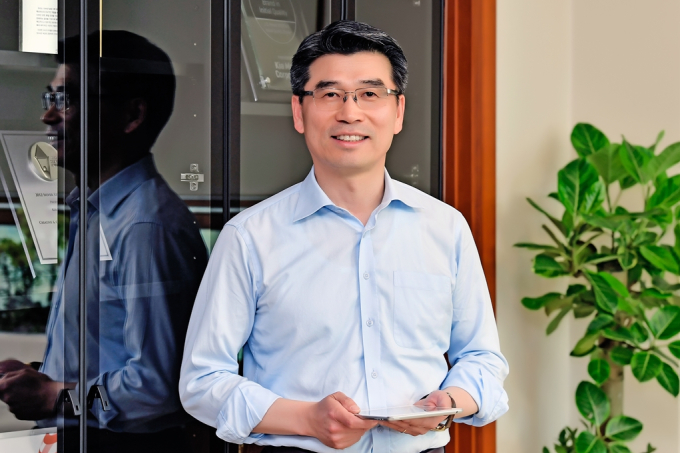CEO interview
Kia aims to become purpose-built vehicle market leader: CEO
By Feb 02, 2021 (Gmt+09:00)
4
Min read
Most Read
LG Chem to sell water filter business to Glenwood PE for $692 million


Kyobo Life poised to buy Japan’s SBI Group-owned savings bank


KT&G eyes overseas M&A after rejecting activist fund's offer


StockX in merger talks with Naver’s online reseller Kream


Mirae Asset to be named Korea Post’s core real estate fund operator



Kia Corp. recently dropped Motors from its name and changed the design and color of the logo that had represented the Korean automaker globally for three decades.
Such a rare and bold move is often associated with heavy costs and a long haul to rebuild a corporate identity among consumers, perhaps even more daunting for established companies like Kia.
Behind Kia’s daring decision was Chief Executive Song Ho-sung, who took the helm of the carmaker in mid-June 2020.
“An automaker is no longer a company that just makes cars. A car will soon turn into a mobile device that moves on its own, wirelessly connected to other cars, homes and workplaces. Kia Motors doesn’t reveal enough of our identity,” Song said in a recent exclusive interview with The Korea Economic Daily.
The CEO said Kia will be reborn as a first-mover instead of a fast-follower in the era of future mobility by focusing on electric vehicles, particularly the emerging segment of purpose-built vehicles (PBV).
Kia, a unit of Hyundai Motor Group, plans to unveil personalized vehicles based on a dedicated PBV platform from 2024 at the earliest, and such vehicles are set to reach 1 million units in 2030 alongside its global auto sales target of 4 million units that year, he said.
Having majored in French language and literature at Yonsei University, Song joined Kia in 1988 and worked in France as a country manager for years from 2007 before ascending to the top post in 2020.

The following is an edited transcript of the interview:
▶ What changes are you pursuing following the corporate rebranding?
“The proportion of electric vehicles will increase drastically. Next month, we’ll unveil new EVs, code-named CV, that are based on our group’s E-GMP electric-car-only platform. Our EV production will steadily rise to 880,000 units in 2030. The names of our dedicated EVs will be EV1, EV2 and so on. Just electric vehicle one, two and so forth. This shows Kia’s determination to lead the EV market. In 2023, we are planning to launch a car that wirelessly updates various functions as well as the navigation.”
▶ Your sister firm Hyundai Motor recently launched its standalone EV sub-brand IONIQ. Does Kia have any such plan?
“No. We don’t. Our EV lineup includes seven electric cars running on the dedicated EV platform by 2030 plus up to 11 EVs that are variants from existing models by that time. That means our main business axis is shifting to EVs. I don’t think we need a separate EV sub-brand.”
▶ What is Kia’s future growth engine?
“Purpose-built vehicles. Most automobiles sold now are not fully meeting the mobility requirements of customers. Global logistics companies such as DHL and UPS buy general-purpose cars and adapt them to their own purposes. These specialized vehicles can be made based on flexible skateboard platforms. You can have a moving drug store, a restaurant, and a bookstore on the move. If the self-driving technology is added, the PBV market will grow explosively.”
▶ Any reason for Kia to zero in on the special-purpose vehicles?
“Kia can be flexible and quickly respond to customer requirements. We are already making military vehicles, a type of PBVs. We’ll unveil personalized vehicles based on our dedicated PBV platform from 2024 at the earliest, and such vehicles will reach 1 million units in 2030 in addition to its global auto sales target of 4 million units that year. We want to be the world’s top player in this segment.”
▶ What’s Kia’s business situation in China?
“China is one of our biggest challenges. We have launched several vehicles tailored to various needs of the Chinese market. And that worked in a way that strengthens the image of Kia as a cheap brand there. From now on, we plan to introduce more premium models with higher price tags into China and cut incentives. We aim to rebrand ourselves as a maker of high-end cars.”
▶ How do you want to differentiate Kia from Hyundai Motor?
“Kia is a young and dynamic brand. Our main target clients are millennials. We will change everything from design to the interior to meet their tastes and needs.”
▶ Does Kia plan to make EV batteries internally?
“It’s not that simple. Building a battery plant will cost you as much as building a car manufacturing plant. This is an issue that should be determined at the group-wide top management level.”
▶ Some Korean drivers are asking Kia to sell the Telluride SUV in Korea, not just in the United States. Your thoughts?
“The Telluride is targeting the US market. We don’t plan to bring it into the Korean market.”
Write to Byung-Uk Do at dodo@hankyung.com
In-Soo Nam edited this article.
More to Read
-
 Quarterly earningsKia delivers Q4 earnings surprise; operating profit hits all-time high
Quarterly earningsKia delivers Q4 earnings surprise; operating profit hits all-time highJan 27, 2021 (Gmt+09:00)
2 Min read -
 ESG bondsKia to issue green notes as part of $500 mn global bonds for future mobility
ESG bondsKia to issue green notes as part of $500 mn global bonds for future mobilityJan 18, 2021 (Gmt+09:00)
3 Min read -
 Corporate rebrandKia drops Motors from name, unveils roadmap for new EV models
Corporate rebrandKia drops Motors from name, unveils roadmap for new EV modelsJan 15, 2021 (Gmt+09:00)
2 Min read -
 SUV salesHyundai, Kia rev up SUV sales in India amid pandemic lockdown
SUV salesHyundai, Kia rev up SUV sales in India amid pandemic lockdownJan 11, 2021 (Gmt+09:00)
1 Min read -
 SUV salesSUVs drive up Hyundai, Kia in US market; G80 named safest car of year
SUV salesSUVs drive up Hyundai, Kia in US market; G80 named safest car of yearDec 31, 2020 (Gmt+09:00)
2 Min read
Comment 0
LOG IN


